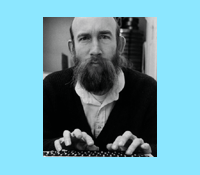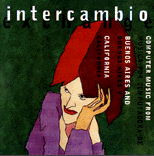

(English version)
(Portuguese version)
by Regis Rossi Alves Faria
(regis@lsi.usp.br)
or Local mirror.
![]() El Camino de Silicio was created to be an electronic network designed to
promote computer music in the Americas
. It was an extension of a computer music exchange program between the Center
for Research in Computing and the Arts ( University
of California, San Diego ), the Laboratorio de Investigación y Produccion
Musical (Centro Cultural Recoleta, Buenos Aires), and the Center
for Computer Research in Music and Acoustics at Stanford University. The exchange
program was funded from 1990-95 by the Rockefeller Foundation. The
information has not been updated and some of the links have expired.
El Camino de Silicio was created to be an electronic network designed to
promote computer music in the Americas
. It was an extension of a computer music exchange program between the Center
for Research in Computing and the Arts ( University
of California, San Diego ), the Laboratorio de Investigación y Produccion
Musical (Centro Cultural Recoleta, Buenos Aires), and the Center
for Computer Research in Music and Acoustics at Stanford University. The exchange
program was funded from 1990-95 by the Rockefeller Foundation. The
information has not been updated and some of the links have expired.
The network's mission was to foster collaborative research, music production, and education. It was a project of CRCA's research associate Robert Willey (bobw@ucsd.edu). The name for the network was derived from "El Camino Real" (The Royal Highway), a coastal road built in California between 1769-1823. It went for 600 miles (970 km) from San Diego to Sonoma, connecting 21 missions, 4 presidios (forts), and 3 pueblos (civilian settlements) built beside or near it.
Argentina
Bolivia
Brazil
Chile
Cuba
Colombia
Ecuador
Mexico
Peru
Puerto Rico
Spain
Uruguay
Venezuela
Please send information on electroacoustic music activities in Latin America so that we may be more comprehensive.
The University of Texas is operating a Latin America Network Information Center.

Stanford's research projects are summarized on their web pages.
 A double
compact disk documenting some of the musical results of the "Intercambio"
exchange between CRCA, CCRMA, and LIPM is available.
A double
compact disk documenting some of the musical results of the "Intercambio"
exchange between CRCA, CCRMA, and LIPM is available.
Leonardo Music Journal CD Series Volume 4, contains electroacoustic music by Latin American composers.
The Electronic Music Foundation distributes CDs by mail.
The Computer Music Journal Sound Anthology includes in its 20 selections over 60 minutes of compositions and sound examples from composers such as Clarence Barlow, Ludger Bruemmer, Paul Lansky, D. Gareth Loy, Mari Kimura, Jean-Claude Risset, Neil B. Rolnick, Denis Smalley, Rick Taube, James Tenney, Barry Truax, Tamas Ungvary, and Amnon Wolman, and researchers of the likes of James Beauchamp, Perry Cook, Lippold Haken, Andrew Horner, Peter Langston, Xavier Serra, and Julius Smith.
The Art Deadlines List is a list of competitions, contests, call for entries/papers, grants, scholarships, fellowships, jobs, internships, etc, in the arts or related areas maintained by Pete Bastien.
An archive of MIDI compositions for piano sound and synthesizer(s) is stored at CRCA.
Music-Cal is a new international online music event calendar. Send in your own event or examine the listsings from others.
Robert Willey has described some of his processes for algorithmic improvisation.
The Gaudeamus Foundation distributes information about contemporary music events, some of which include music technology.
(the pueblos)
A list of schools offering courses in sound and computer music has been compiled by Clark Streeter (streeter@nersc.gov). A more comprehensive list of universities (with or without electronic music programs) has been compiled by Christina DeMello. Columbia University is host to another list of universities.
Stanford University has a few classes available online by anonymous ftp. The archive includes information on DSP and the Music Kit.
The Amsterdam Catalogue of Composition Algorithms is a database organized by Alcedo Coenen (alcedo@mars.let.uva.nl) for composers and programmers involved in algorithmic composition.
MuSIG is a Special Interest Group for Music - a network of people helping each other learn about computers and music: MIDI, hardware, software, education, composition, performance, and programming.
The TIMARA computer music studio at Oberlin College offers workshops in computer music.
Paul Lansky's Homepage
at Princeton University is a model
for the professor of the future.
The Computer Music Journal Archives are connected with the main publication for the academic computer music community. Sound examples are contained in the the Sound File Archives.
There are many electronic discussions taking place through the USENET
news program.
Ricardo
Dal Farra, one of the leading promoters of electronic music in Latin America,
has posted a paper
on the history of its electroacoustic and computer music. Contact him to submit
pieces for radio station play in Buenos Aires.
(the presidios)
The Summer 1994 issue of the Computer Music Journal (vol. 18, no. 2) contained Stephen Pope's listing of electronic resources for computer music. Consult this list for many additional resources.
The International Computer Music Association (ICMA) Software Library is maintained for the benefit of the computer music community. It is available by anonymous ftp from Dartmouth.EDU and is maintained by Robert Newcomb (Robert.S.Newcomb@Dartmouth.EDU).
The Pacifica radio network is an important outlet for contemporary culture. Carl Stone (cstone@netcom.com) has been connected with them for many years and has collected some of the playlists from his programs.
DIFFUSION i MeDIA is distributing
electroacoustic music from the Montreal, Canada area.
(the missions)
The Center for Research in Computing and the Arts (formerly the Center for Music Experiment), University of California, San Diego. Home of the Computer Audio Research Laboratory and development site for cmusic and the CARL software. Presently directed by visual artist Harold Cohen.
Center for Computer Research in Music and Acoustics (CCRMA) at Stanford University maintains a ftp server.
The IRCAM institute in Paris maintains an archive. They also have a web interface. It is in French, but there there is also an index available in English. "Ostinato", the informational newsletter of the Documentation Center of Contemporary Music comprizes, among many other things, detailed lists of concerts and festivals in France (and some abroad), informations for composers and interpreters, etc.
The CERL Sound Group at the University of Illinois at Urbana/Champaign maintains a www server.
Bruce Pennycook is the principal investigator behind McGill University 's Music Library of the Future. They are working on a new audio player which will include support for general midi files. They hope to link Text, MAPS (scores), MIDI, AUdio, QTime with common segment points.
The Indiana University Library maintains a extensive list of music
resources on the Internet.
The Center for New Music and Audio Technology
(CNMAT) at the University of California, Berkeley has a network-accessible Gopher
server. To access the information open a Gopher client to the machine cnmat.cnmat.berkeley.edu
with a port number of 70.
The Center for Computer Music Research and Composition at the University of California Santa Barbara is online.
The Center for Studies in Music Technology (CSMT) is a facility associated with the Yale University School of Music and the Yale University Department of Music. Its function is to explore the use of computer and information technologies, both as a compositional medium and as a research tool.
A www front end for information on csound is available from Leeds University. They have the manual online.
Ruggero Andrea Ruschioni (roger@lsi.usp.br) reports a web site at the University of São Paulo's Laboratório de Sistemas Integráveis (Laboratory of Integrated Systems). They also have a ftp site with binaries for SGI and the major packages fo r synthesis. The idea is to provide a site for South America, it should be faster than connecting to the USA, and they will soon have fiber-optical connection to the outer world.
Rensslaer Polytechnic offers state-of-the-art electronic media facilities devoted to art in the fast lane.
Computer musicians from Texas have a
site.
The Computer Music Journal's "Basic Computer Music Library" appeared in CMJ 17:3 (Fall, 1993) and is also available from the MIT Press.
A bibliography from FAQ sources is available on books relating to computer music.
Craig Latta has compiled a list of frequently asked questions about electronic music.
Bob McQueer has put together the MUSENET MIDI Primer for basic information on the MIDI specification.
Jason Vantomme (vantomme@ILS.NWU.EDU) has compiled a bibliography on score following research.
The UCSD Music Library maintains a front end with information about UC and other music libraries. Their index provides links to many other sites. They maintain a list of University of California/Stanford music libraries.
K & D's
Music Resources has lots of information for composers.
The Chronicle of Higher Education
has web access for their job listings.
http://willshare.com/bobw/camino.html